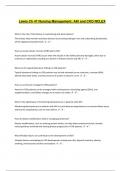Lewis Ch 47 Nursing Management: AKI and CKD NCLEX
What is the role of the kidneys in maintaining acid-base balance?
The kidneys help maintain acid-base balance by excreting hydrogen ions and reabsorbing bicarbonate,
which regulates blood pH levels. ✔️✔️
How can acute tubular necrosis (ATN) lead to AKI?
Acute tubular necrosis (ATN) occurs when the tubules in the kidneys become damaged, often due to
ischemia or nephrotoxins, leading to a decline in kidney function and AKI. ✔️✔️
What are the typical laboratory findings in CKD patients?
Typical laboratory findings in CKD patients may include elevated serum creatinine, increased BUN,
altered electrolyte levels, and the presence of protein or blood in urine. ✔️✔️
How can anemia be managed in CKD patients?
Anemia in CKD patients can be managed with erythropoiesis-stimulating agents (ESAs), iron
supplementation, and dietary changes to increase iron intake. ✔️✔️
What is the significance of monitoring blood pressure in patients with AKI?
Monitoring blood pressure in patients with AKI is crucial because hypertension can worsen kidney injury
and lead to complications such as heart failure. ✔️✔️
How do dietary modifications help in managing proteinuria?
Dietary modifications, such as reducing protein intake, can help lower proteinuria levels, thereby
reducing kidney workload and slowing disease progression in CKD patients. ✔️✔️
What lifestyle factors can contribute to the development of CKD?
Lifestyle factors contributing to CKD development include poor diet, physical inactivity, obesity,
smoking, and excessive alcohol consumption. ✔️✔️
,How does chronic kidney disease affect fluid balance in the body?
Chronic kidney disease impairs the kidneys' ability to excrete excess fluid, leading to fluid retention,
edema, and hypertension. ✔️✔️
What is the function of the glomerulus in kidney function?
The glomerulus is a network of tiny blood vessels in the kidney that filters blood, allowing water and
small molecules to pass while retaining larger proteins and cells. ✔️✔️
What role do potassium-sparing diuretics play in managing hypertension in CKD patients?
Potassium-sparing diuretics help manage hypertension by promoting fluid excretion without causing
potassium loss, which is important in CKD patients who are at risk for hyperkalemia. ✔️✔️
How can patients with CKD manage their phosphorus levels?
Patients with CKD can manage phosphorus levels by following a low-phosphorus diet, taking phosphate
binders, and avoiding high-phosphorus foods such as dairy and processed foods. ✔️✔️
What are some potential effects of hyperkalemia in CKD patients?
Hyperkalemia can lead to serious complications, including heart arrhythmias, muscle weakness, and
potential cardiac arrest, making its management critical in CKD patients. ✔️✔️
How can regular screening for kidney disease benefit at-risk populations?
Regular screening for kidney disease in at-risk populations can lead to early detection, timely
intervention, and prevention of disease progression. ✔️✔️
What are the typical symptoms of fluid overload in CKD patients?
Typical symptoms of fluid overload in CKD patients include swelling in the legs and abdomen, shortness
of breath, and rapid weight gain due to excess fluid retention. ✔️✔️
How does renal failure impact medication dosing?
, In renal failure, medication dosing may need to be adjusted to prevent accumulation of drugs and their
metabolites, which can lead to toxicity and adverse effects. ✔️✔️
What are intrarenal causes of acute kidney injury (AKI) (select all that apply)?
a. Anaphylaxis
b. Renal stones
c. Bladder cancer
d. Nephrotoxic drugs
e. Acute glomerulonephritis
f. Tubular obstruction by myoglobin ✔️✔️d, e, f. Intrarenal causes of acute kidney injury (AKI)
include conditions that cause direct damage to the kidney tissue, including nephrotoxic drugs, acute
glomerulonephritis, and tubular obstruction by myoglobin, or prolonged ischemia. Anaphylaxis and
other prerenal problems are frequently the initial cause of AKI. Renal stones and bladder cancer are
among the postrenal causes of AKI.
An 83-year-old female patient was found lying on the bathroom floor. She said she fell 2 days ago and
has not been able to take her heart medicine or eat or drink anything since then. What conditions could
be causing prerenal AKI in this patient (select all that apply)?
a. Anaphylaxis
b. Renal calculi
c. Hypovolemia
d. Nephrotoxic drugs
e. Decreased cardiac output ✔️✔️c, e. Because the patient has had nothing to eat or drink
for 2 days, she is probably dehydrated and hypovolemic. Decreased cardiac output (CO) is most likely
because she is older and takes heart medicine, which is probably for heart failure or hypertension. Both
hypovolemia and decreased CO cause prerenal AKI. Anaphylaxis is also a cause of prerenal AKI but is not
likely in this situation. Nephrotoxic drugs would contribute to intrarenal causes of AKI and renal calculi
would be a postrenal cause of AKI.




